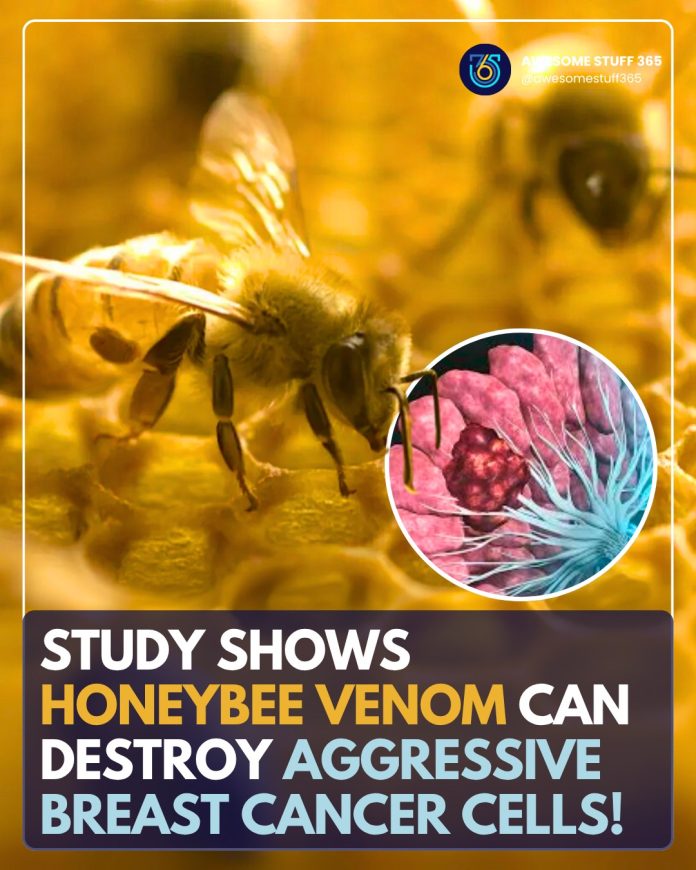A groundbreaking study led by researchers in Australia has found that honeybee venom, particularly its key component melittin, can rapidly and selectively kill some of the most treatment-resistant forms of breast cancer—specifically triple-negative and HER2-positive subtypes—while leaving healthy cells largely unharmed.
The Power of Melittin
Melittin is the primary bioactive peptide in honeybee venom, comprising up to 50–60% of its dry weight. This small, positively charged molecule is infamous for causing the intense pain of a bee sting—but in controlled laboratory conditions, it is proving lethal to aggressive cancer cells.

In lab tests, researchers found that melittin disrupts cancer cell membranes within an astonishingly short time, leading to complete destruction of cancer cells in just about 60 minutes, while normal cells showed minimal damage. The venom also halts internal cancer-cell messaging—disabling vital growth signals that cancer relies on to thrive.
How It Works: Dual Attack on Cancer Signals
Melittin’s effectiveness stems from its dual-action mechanism:
Membrane Disruption
Melittin forms tiny pores in the cell membrane—holes that result in rapid leakage and cell death.
Signal Blockade
Within minutes, it also interferes with key receptors such as EGFR and HER2 on cancer cells’ surfaces, preventing their activation and halting downstream proliferation signals.
This combination—physical destruction plus biochemical interference—gives melittin a powerful edge against cancer cells that often evade treatment through alternate growth pathways.
Selectivity: Cancer Cells vs. Healthy Cells
One of the most encouraging findings of the research is its precision. Melittin and whole bee venom targeted aggressive cancer cells, like triple-negative and HER2-enriched types, while largely preserving non-cancerous cells such as healthy breast cells.
Even venom from other insect species that do not contain melittin showed little to no effect on cancer cells—confirming that melittin is the critical active compound behind these powerful results.
Enhancing Treatment with Chemotherapy
The study also explored pairing melittin with existing chemotherapy drugs like docetaxel. In mouse models of triple-negative breast cancer, this combination proved to be more effective in shrinking tumors than either substance alone.
This opens the possibility that melittin could be used to enhance drug delivery, helping chemotherapy agents to more easily enter cancer cells—or even reduce the required dosage, thereby lowering potential side effects.
Why This Matters
Aggressive breast cancers like triple-negative and HER2-positive types are notoriously difficult to treat:
- Triple-negative breast cancer (TNBC) lacks estrogen, progesterone, and HER2 receptors—rendering hormone-based therapies ineffective and often leading to early chemotherapy resistance.
- HER2-enriched cancers, while targetable with certain drugs, tend to adapt quickly and become resistant to treatment.
- Melittin’s combined approach—membrane disruption and receptor blockade—provides a way to strike these resilient cancer cells on multiple levels, potentially overcoming common resistance mechanisms.
- Natural, Accessible, but Still Early-Stage
A major advantage of this approach is that bee venom is natural, low-cost, and widely available. Moreover, melittin can now be synthesized in laboratories, ensuring consistency and avoiding dependence on live bee populations.
However, it’s important to note that this research is still in its early phases. All findings so far have come from cell culture studies and animal models. Human clinical trials are needed before this therapy can be deemed safe and effective for patients.

A Look to the Future
Researchers are now focusing on:
Refining melittin delivery methods, possibly using nanoparticles or other targeted systems
Determining optimal dosage and frequency that minimize toxicity
Conducting early-stage human trials to evaluate safety and therapeutic outcomes
These next steps will help determine whether melittin-based treatments could become part of standard oncology care in the future.
The discovery that melittin from honeybee venom can selectively destroy aggressive breast cancer cells opens a new and hopeful frontier in cancer research. Its dual mechanism of action, high precision, and ability to pair with chemotherapy make it a potentially powerful tool in the fight against cancer.
Though more work is needed, the findings offer a clear example of how nature continues to inspire modern medicine. With the right development and clinical validation, bee venom could play a real role in transforming treatment for some of the most difficult-to-treat breast cancers.

















